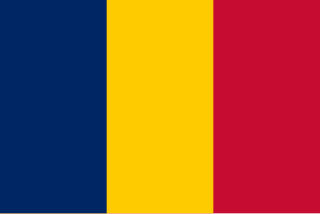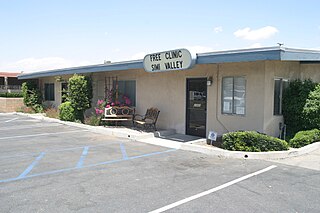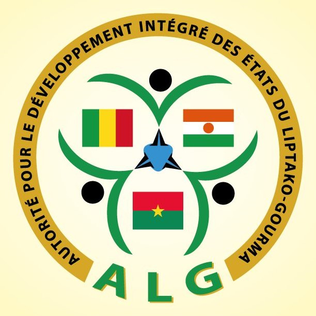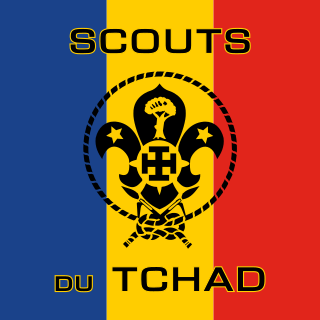
Chad, officially the Republic of Chad, is a landlocked country located at the crossroads of North and Central Africa. It is bordered by Libya to the north, Sudan to the east, the Central African Republic to the south, Cameroon to the southwest, Nigeria to the southwest, and Niger to the west. Chad has a population of 16 million, of which 1.6 million live in the capital and largest city of N'Djamena. With a total area of around 1,300,000 km2 (500,000 sq mi), Chad is the fifth-largest country in Africa and the twentieth largest nation by area in the world.

Community-supported agriculture or cropsharing is a system that connects producers and consumers within the food system closer by allowing the consumer to subscribe to the harvest of a certain farm or group of farms. It is an alternative socioeconomic model of agriculture and food distribution that allows the producer and consumer to share the risks of farming. The model is a subcategory of civic agriculture that has an overarching goal of strengthening a sense of community through local markets.

The United Farm Workers of America, or more commonly just United Farm Workers (UFW), is a labor union for farmworkers in the United States. It originated from the merger of two workers' rights organizations, the National Farm Workers Association (NFWA) led by César Chávez and Dolores Huerta and the Agricultural Workers Organizing Committee (AWOC) led by organizer Larry Itliong. They allied and transformed from workers' rights organizations into a union as a result of a series of strikes in 1965, when the Filipino American and Mexican American farmworkers of the AWOC in Delano, California, initiated a grape strike, and the NFWA went on strike in support. As a result of the commonality in goals and methods, the NFWA and the AWOC formed the United Farm Workers Organizing Committee on August 22, 1966. This organization was accepted into the AFL–CIO in 1972 and changed its name to the United Farm Workers Union.

Murzuq is one of the districts of Libya. It is in the south of the country. Its capital is Murzuk. The city was occupied by the Ottoman Empire in 1578 and served as the capital of Fezzan off and on until the Ottomans ceded Libya to Italy in 1912. It was not occupied by the Italians until 1914.

Central Africa is a subregion of the African continent comprising various countries according to different definitions. Middle Africa is an analogous term used by the United Nations in its geoscheme for Africa and consists of the following countries: Angola, Cameroon, Central African Republic, Chad, Democratic Republic of the Congo, Republic of the Congo, Equatorial Guinea, Gabon, and São Tomé and Príncipe. The United Nations Office for Central Africa also includes Burundi and Rwanda in the region, which are considered part of East Africa in the geoscheme. These eleven countries are members of the Economic Community of Central African States (ECCAS). Six of those countries are also members of the Economic and Monetary Community of Central Africa (CEMAC) and share a common currency, the Central African CFA franc.

A clinic is a health facility that is primarily focused on the care of outpatients. Clinics can be privately operated or publicly managed and funded. They typically cover the primary care needs of populations in local communities, in contrast to larger hospitals which offer more specialized treatments and admit inpatients for overnight stays.

A free clinic or walk in clinic is a health care facility in the United States offering services to economically disadvantaged individuals for free or at a nominal cost. The need for such a clinic arises in societies where there is no universal healthcare, and therefore a social safety net has arisen in its place. Core staff members may hold full-time paid positions, however, most of the staff a patient will encounter are volunteers drawn from the local medical community.

World Food Day is an international day celebrated every year worldwide on October 16 to commemorate the date of the founding of the United Nations Food and Agriculture Organization in 1945. The day is celebrated widely by many other organizations concerned with hunger and food security, including the World Food Programme, the World Health Organization and the International Fund for Agricultural Development. WFP received the Nobel Prize in Peace for 2020 for their efforts to combat hunger, contribute to peace in conflict areas, and for playing a leading role in stopping the use of hunger in the form of a weapon for war and conflict.

The Liptako–Gourma Authority is a regional organization seeking to develop the contiguous areas of Mali, Niger, and Burkina Faso.

The Fédération du Scoutisme Tchadien, the national federation of two Scouting organizations in Chad, was founded in 1960, and became a member of the World Organization of the Scout Movement in 1974. The coeducational Fédération du Scoutisme Tchadien has 14,500 members as of 2011.

Marshfield Clinic Health System is an integrated health system serving Wisconsin founded in 1916. The system contains several hospitals and many clinics throughout Wisconsin, as well as a medical research institute and an education division, and employs more than 1,200 doctors and other clinicians.

The organization SEKEM was founded in 1977 by the Egyptian pharmacologist and social entrepreneur Dr. Ibrahim Abouleish in order to bring about cultural renewal in Egypt on a sustainable basis. Located northeast of Cairo, the organization now includes:
Blood:Water Mission is an international nonprofit that partners with African community-driven organizations to end health disparities caused by the HIV/AIDS and water crises. It is based in Nashville, Tennessee, US, and is led by Jake Smith.
International Orthodox Christian Charities, Inc., based in Baltimore, Maryland, is the official international humanitarian agency of the Assembly of Canonical Orthodox Bishops of the United States of America. IOCC works in cooperation with the Orthodox Church and other partners to serve people in need. In carrying out its mission, IOCC applies the highest professional standards and renders itself fully accountable to the public and its donors.
The Poney du Logone is a breed of small horse or pony from the area of the Logone River in Chad and Cameroon, in west central Africa. It is particularly associated with the Musey or Moussey people of that region, and may also be known as the Poney Musey or Poney Mousseye.

The wildlife of Chad is composed of its flora and fauna. West African lions, buffalo, hippopotamuses, Kordofan giraffes, antelopes, African leopards, cheetahs, hyenas, Bush elephants, and many species of snakes are found there, although most large carnivore populations have been drastically reduced since the early 20th century. Elephant poaching, particularly in the south of the country in areas such as Zakouma National Park, is a severe problem.

World Concern is a Christian global relief and development organization operating in Africa, Southeast Asia, and Haiti, with its headquarters located in Seattle, Washington, United States. World Concern serves approximately 6 million people worldwide and has a staff of 877, with 846 of those being international and 31 based at headquarters.

In 2020, approximately 80% of Chad's labor force was employed in the agricultural sector. This sector of the economy accounts for 52.3% of the GDP, as of 2017. With the exception of cotton production, some small-scale sugar cane production, and a portion of the peanut crop, Chad's agriculture consists of subsistence food production.
United Health Centers of the San Joaquin Valley is a private non-profit organization, established from a grass root movement by people trying to improve access to healthcare in their rural communities in California's Central Valley.
Events in the year 2011 in Chad.














